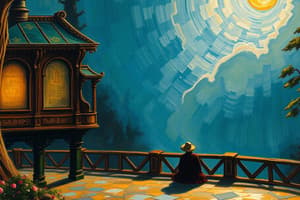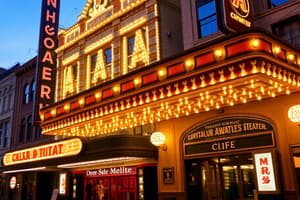Podcast
Questions and Answers
Who is known as the father of tragedy in ancient Greek theater?
Who is known as the father of tragedy in ancient Greek theater?
- Aeschylus (correct)
- Euripides
- Sophocles
- Plautus
Which playwright is ranked with Shakespeare as one of the greatest of all time?
Which playwright is ranked with Shakespeare as one of the greatest of all time?
- Plautus
- Sophocles (correct)
- Aeschylus
- Euripides
Which Roman dramatist introduced some technical innovations to Roman theater?
Which Roman dramatist introduced some technical innovations to Roman theater?
- Aeschylus
- Sophocles
- Euripides
- Plautus (correct)
Which play is considered a tragedy about a woman seeking revenge upon her husband by killing her own children?
Which play is considered a tragedy about a woman seeking revenge upon her husband by killing her own children?
What metal chips were attached to the footwear of Roman actors for theatrical performances?
What metal chips were attached to the footwear of Roman actors for theatrical performances?
What is the term used to describe the meaning of a play, as opposed to what happens in the plot?
What is the term used to describe the meaning of a play, as opposed to what happens in the plot?
Which element of a play encompasses the visual aspects like scenery, costumes, and special effects?
Which element of a play encompasses the visual aspects like scenery, costumes, and special effects?
What is the purpose of instrumental music played as underscore in a play?
What is the purpose of instrumental music played as underscore in a play?
Which type of vocal music sets a group of poems by one poet to music by one composer?
Which type of vocal music sets a group of poems by one poet to music by one composer?
What is the main focus of an Oratorio in terms of its musical context?
What is the main focus of an Oratorio in terms of its musical context?
Flashcards are hidden until you start studying
Study Notes
Theatre and Script
- A script is a text that a theatre production is based on and is the domain of the playwright
- A script consists of thought, theme, or ideas, which is the meaning behind the play
- It also includes the plot or action, which are the events that take place in the play
- The script includes language, which is the conversation between characters
Elements of a Play
- Exposition: The introduction of conflict
- Complications: The build-up of tension
- Climax: The highest point of tension
- Resolution: The conflict is settled and the play ends
Music in Theatre
- Music includes sound effects, actor's voices, songs, and instrumental music
- Music creates a pattern and establishes tempo in theatre
- In musical theatre, songs are used to push the plot forward and increase intensity
Vocal Music
- Art song: A lyrical melody that sets written poetry to music
- Accompaniment: Usually piano, which adds emotion to the song
- Form: Through-composed form and strophic form are two types of song structures
- Song cycle: A group of poems by one poet set to music by one composer
Instruments and Musical Theatre
- Piano: A popular instrument in musical theatre
- Symphonic poem: A "tone poem" that portrays a story or has literary or artistic background
- Musical theatre: A piece that combines music, spoken dialogue, and dance to tell a story
History of Western Classical Theatre
- Originated from the Greek word "theatron" meaning "seeing places"
- Collaborative form of fine art that uses live performers to present a real or imagined event
Ancient Greek Theatre
- Originated in 500 BC with stage comedies and tragedies
- Ancient Greek tragedies: Conflicts that evolve from the clash between the will of the gods and human ambitions
- Famous Greek tragedy writers: Aeschylus, Sophocles, and Euripides
Ancient Greek Tragedy Writers
- Aeschylus: Known as the father of tragedy, wrote 90 plays, but only 7 have been preserved
- Sophocles: Ranked with Shakespeare as one of the greatest playwrights of all time
- Euripides: Focused on people's lives and questioned fate and the gods, wrote 92 plays, 18 of which still exist
Studying That Suits You
Use AI to generate personalized quizzes and flashcards to suit your learning preferences.




